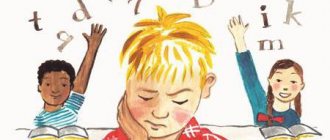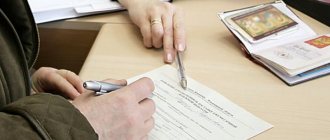Purpose and content
Children are the most defenseless in the harsh realities of the cruel modern world. It is with the aim of protecting this category of the planet’s population that special guardianship and trusteeship bodies have been created in each state.
Their powers/official responsibilities include constant monitoring of compliance with the rights of the child in the family, on the street, in educational and other social institutions. Characteristics help to collect and classify complete information about each young child or adolescent.
The document contains maximum information about such factors as:
- social adaptation of a young/minor child;
- the level of his intellectual and mental development;
- character traits, behavioral aspects, hobbies;
- level of material support;
- general psychological comfort of the given environment where the child resides.
Only a person who spends a long time with a minor during the day can provide the above information with a high level of reliability. For example, a class teacher at a school, a circle leader, a school psychologist or a social worker who has been observing the student’s behavior for a long time.
Approximate writing of characteristics for a student at PMPK material on the topic
He is calm in class and participates during class. Can answer the question posed. Understands learning objectives. The ability to exert volition is reduced, and often does not complete the work started. Sasha does not have sufficiently developed skills and abilities to master the educational material. Mastering the program material:
The adaptation period was slow and difficult. A teenager does not have enough knowledge about the world around him. Knows information about himself, his mother’s name and patronymic. Experiences difficulties in establishing simple cause-and-effect relationships between phenomena of reality. General motivation is social. Educational and cognitive motivation is poorly developed. Attention is unstable, often distracted, attention span is insignificant. He understands educational instructions, but cannot work on them independently. Cannot independently find and correct errors in his work. It is difficult for Sasha to express his elementary judgment, to draw a simple logical conclusion. Fine motor skills of the hands are well developed, and does not experience difficulties in orienting in notebooks for counting and writing. Follows daily routine.
The mother is not an emotionally significant person for the minor, although her attitude towards her is positive. The mother, due to her individual personal abilities and state of health, is able to satisfy only the minimum necessary needs to maintain the life activity and upbringing of the minor.
Communication sphere: friendly, open, easily establishes contact, but is not inclined to communicate in a wide circle, preferring individual activities. The style of communication with others is non-dominant - compliant, easily admits being wrong, needs support when talking. Accepted by the team.
The girl arrived at the Krasnokamensk orphanage on January 1, 2008 from the “Solnyshko” orphanage in the city of Krasnokamensk. She previously lived in the village of Soktuy-Milozan. Currently, the girl is studying in 9th grade at secondary school No. 10. . Until 2009, she studied at Secondary School No. 2, then was transferred to Secondary School No. 11, due to the fact that the girl did not master the general education school curriculum. Now the girl’s educational activities are formed at the proper level. Diligence in educational activities is good. The girl has difficulty completing assignments in the Russian language and makes mistakes in spelling unstressed vowels, voiceless and voiced consonants. There are difficulties in memorizing text and retelling works. In mathematics, he has difficulty solving problems: he does not know how to correctly find solutions. Now the girl counts well. I began to write legibly, more calligraphically. Additional classes and error analysis yielded results. Completes homework conscientiously. There was order in the notebooks and in the diary. We can say that the girl’s educational activity has developed, but since the girl’s vocabulary is poor and her active vocabulary is not large, it is therefore necessary to continue work in this regard. Invite her to read more books from the library. Vika enjoys drawing and enjoys attending the Fashion Theater, Smak, and football clubs. She is very active and takes part in all activities both at school and at home. Good acting skills. The girl is efficient, sociable and friendly, so she has no problems with her peers and with adults. Relations with everyone are smooth.
We recommend reading: It’s true that St. Petersburg pensioners can ride the railway for free
When is it necessary to provide a student’s reference to the Department of Guardianship and Trusteeship?
Requests for a complete description of the behavior and social development of a particular child come from the Department of Guardianship and Trusteeship in the following situations:
- if legal proceedings have been initiated regarding the deprivation of parental rights of the father or mother;
- when a police case has been opened against a child/minor, and the child is suspected of committing a criminal or other type of offense;
- if the child’s behavior is noticeably cruel, constant conflicts arise;
- when suicidal tendencies were noticed in the ward;
- if a request has been received to adopt a child, a reference is required for those wishing to adopt at their place of work/place of residence and other situations;
- all dysfunctional, low-income families are under constant control of the guardianship and trusteeship service, as a result of which children from such families must be provided with a complete profile at least once a year.
Characteristics of an orphanage pupil from a teacher
The child can understand the main idea of a fairy tale, a picture, combine several pictures based on a common feature, sort pictures into groups based on an essential feature, but is not well oriented in space and time. Characteristics of a child, sample
The document drawn up by the teacher, describing the level and degree of personal development, must indicate the child’s performance, reaction to comments and demands, ability to manage his behavior, character traits (modest, quiet, impulsive, etc.). The description of the personality of a preschooler should also reflect the state of psychophysical processes: attention (stable or not), ability to concentrate, switchability, perception of phenomena (appropriate or not for age), the child’s time representations, development of memory and verbal-logical thinking. The characteristics of the child in the preschool educational institution from the teacher must be dated. The teacher's signature is placed on the last page. The document is endorsed by the head of the preschool educational institution.
The mother, due to her individual personal abilities and state of health, is able to satisfy only the minimum necessary needs to maintain the life activity and upbringing of the minor. An emotionally significant and attractive person for the child is her aunt (mother’s sister), with whom the minor maintains a positive relationship, however, due to their separate residence and only periodic contact, they do not fully satisfy the needs that were not satisfied in turn by the parents. Educational psychologist _____________ UO
The social shelter is allocated special premises in accordance with the established procedure, which must be sufficient in area, aesthetic, have all types of communal amenities (central heating, water supply, sewerage, electric lighting, radio, telephone), meet sanitary and hygienic standards, fire safety requirements and be equipped with the necessary rigid and soft goods, other material supplies and equipment. Preschool educational institutions employees who make up the profile must adhere to the standards of the educational program adopted in their institution. Such a requirement will help assess the degree to which the preschooler has mastered the material and see a list of goals he has achieved.
Loves to be in kindergarten. A sample of writing a psychological and pedagogical profile for a child. Psycho-pedagogical characteristics. When entering a kindergarten, any educational institution, or to provide information about a specific person to government agencies, a character reference for a kindergarten child may be required. The drafting template may change. Psychological characteristics of the child f. attending kindergarten from 2011 Alicia is brought and picked up from kindergarten mainly by her mother, sometimes together with her father.
To pass the PMPK or ITU commission, a pedagogical characteristic for a child is required. It can be written on specific points or in any form. I offer a sample of my characteristics of a child aged 3.5 years, which was attached to the documents for passing the MSE to determine the status of a disabled child. The description was written in free form and was completely appropriate. It must also be certified by the seal of the kindergarten and necessarily the signatures of the teacher and the head.
We recommend reading: Additional payment to repressed people in 2021
During my studies in kindergarten, my active vocabulary increased. Free expressions are dominated by simple, common, complex sentences. There is insufficient development of the grammatical forms of the language (errors in coordination and control)
. Retells coherently, consistently, does not violate semantic parts. Sound pronunciation is at the stage of production and automation of sounds. There are positive dynamics in the learning process.
The child does not immediately show trust in others; negative reactions to requests from adults, stubbornness, and whims are observed. Contacts with peers are short-lived, creates conflict situations during games (takes away and throws toys, pushes children). The games are monotonous, he quickly loses interest in the game, moves from one toy to another.
Educator: Ivanova M.I. Characteristics of a pupil of the state educational institution for children - orphans and children left without parental care "Krasnokamensk orphanage" Full name and date of birth of the child Mother: Father: The girl arrived at the Krasnokamensk orphanage on 01/01/2008 from the orphanage in the city of Krasnokamensk "Solnyshko" previously lived in village of Soktuy-Milozan. Currently, the girl is studying in 9th grade at secondary school No. 10.
Constant monitoring of appearance, cleanliness of clothes, hands, and hairstyle is required. Relationships with classmates are complicated, he often gets angry, freaks out, can tear a book, scatter it, chew a pencil, cannot critically evaluate his actions, there is no adequate understanding of what is good and what is bad. He cannot and does not want to play in a team, creating conflict situations.
Mandatory subparagraphs
It is necessary to know the rules for writing characteristics, because... If they are violated, the document drawn up may have no legal force. The document consists of 3 parts.
In the upper right corner (or in the center of the sheet) indicate the personal data of the child for whom the characteristics are being compiled:
- Child's full name;
- place of study, class;
- date of birth, place of residence.
The next part of the document contains the following information:
- date the child entered school;
- the general level of knowledge at the beginning of studies and the acquired skills at the time of writing the characteristics, which subjects are more successfully mastered, what are the difficulties;
- features of thought processes, memory, attentiveness;
- level of health and physical activity;
- psychological adaptation in a team, relationships with peers, teachers;
- student motivation to study.
General reasonable conclusions and forecasts of the author's characteristics. Date/signature.
Dear readers! To solve your problem right now, get a free consultation
— contact the on-duty lawyer in the online chat on the right or call:
+7
— Moscow and region.
+7
— St. Petersburg and region.
8
- Other regions of the Russian Federation
You will not need to waste your time and nerves
- an experienced lawyer will take care of solving all your problems!
Characteristics of a supervised child from the class teacher
- Title: “Characteristics...”;
- Full name, date of birth, school number and class the child attends,
- place of residence;
- character traits;
- degree of academic performance in core and elective subjects;
- extracurricular interests and additional activities (clubs, sections);
- behavior;
- relationships with peers;
- features of family relationships (cohabitation or separation with mother or father, presence of brothers or sisters, appointment of guardianship or trusteeship);
- the presence or absence of basic things (seasonal clothing and shoes, school supplies), the degree of satisfaction of basic needs (safety, food, warmth, sleep, cleanliness);
- date of;
- signatures.
- motivation for learning, getting an education - strong or weak;
- core and elective subjects with high academic performance;
- core and elective subjects with low performance;
- items of interest
- subjects in which there is a complete lack of interest;
- extracurricular interests;
- stubbornness or flexibility;
- perseverance or restlessness;
- influence or suspiciousness;
- friendliness or isolation;
- restraint or spontaneity;
- organizational skills – strong or weak;
- leadership or followership;
- responsiveness or indifference;
- shyness or boldness;
- respect or insolence;
- independence or need for support, constant control, guidance;
- trusting or hostile relationships in the family;
- aggressiveness or calmness;
- “difficult” or pliable, affectionate disposition;
- high or low self-esteem;
- ambition or modesty;
- satisfied or painful need for acceptance, support, attention from adults and peers;
- close or tense relationships with mother and father, guardian or trustee, relatives.
May 05, 2021 polrostov 150
Share this post
- Related Posts
- Bailiffs Surnames of Bailiffs
- Ukrf 228 Part 2
- An investigative action can be carried out by several investigators. Then, for each of the investigators carrying out search actions, there must be at least two witnesses
- Article 116 Civil Code of the Russian Federation
Features characteristics for children of primary school and high school students
Both in relation to a written characteristic for a child of primary school, and when writing a characteristic for a high school student, the emphasis is on the level of existing knowledge, learning indicators, and the student’s capabilities/abilities.
Regardless of the student’s age, the characteristic necessarily specifies his psycho-social adaptation: conflicts, mood, behavioral factors, etc.
For a child (primary school student), it is recommended to describe the play activities in which the child participates:
- the nature of his gaming interests (varied or the same type, non-specific or standard, stable or short-term);
- what kind of game plan does the child choose (manipulative, procedural, plot, role-playing themes);
- what kind of gaming behavior is typical (initiative or passive, prefers to play alone or strives for company, is more selfish or has a tendency towards altruism in behavior with peers;
- strives for command and chooses leading roles or is content and feels more comfortable in the second and third places.
Such a report of the student’s behavior will make it possible to clearly trace his socialization and make the necessary adjustments.
Expert opinion
Maria Lokshina
Family law expert since 2010
When compiling a profile for a teenager (i.e., a high school student), more attention should be paid to his activities and hobbies, because It is in this period of life that the foundations of his professional adaptation are laid.
Of course, issues of communication, intellectual, emotional, social lability, psychological stability are important sub-points in the process of crystallization of the real image of a teenager. You shouldn't miss them. Below is an example of a reference for a junior school student to the guardianship and trusteeship authorities.
How to write a reference for guardians
When characterizing caregivers, the greatest attention should be paid to how they relate to the child. Write down how long the person under your care has been attending your class or group. Tell us if he experienced difficulties during adaptation, what he looks like, and whether he has developed cultural and hygienic skills. Note the child’s level of development, his communication skills, relationships with adults and with other children. Tell us how willingly the guardians make contact with teachers, and whether they are interested in the child’s successes and failures.
As in the previous case, you need to pay special attention to the attitude of the guardian towards the child. But as a teacher and educator, you most likely do not know this child. Therefore, tell us about the spiritual and professional qualities of the person for whom you are writing a testimonial. Indicate from what moment you have known him, how he has proven himself at work, what his relationships are with other team members, whether he has the qualities necessary to raise a child - responsibility, kindness, a desire to understand other people, how conflicted he is, whether he is prone to bad habits. Complete the description in exactly the same way as in the previous case.
Sample
Characteristics of the student (class/school)
(child’s first name, patronymic),
residing at:
at the request of the guardianship and trusteeship department
year, day, month.
(Child's name) came to first grade in September 2012. Social adaptation in the class was difficult, communication with children was not easy, the boy was quite complex and avoided active participation in any event (it doesn’t matter whether it was a social assignment or a game).
At the beginning of training, a high level of cognitive processes was revealed. Humanitarian subjects (literature, social studies, etc.) are of particular interest. Loves to draw, look at pictures, listen to fairy tales, stories, music.
The vocabulary is small (perhaps due to infrequent communication with peers). There is inattention and absent-mindedness in behavior, especially if the child does not like the topic of the lesson.
The general level of memorization is average, there are the makings of logical perception, and the figurative type of thinking is well developed.
The boy is friendly by nature and willingly responds to requests. (child's name) has not yet taken a particularly active part in the life of the class. According to the results of sociometry, the child is not a leader, but also does not have a tendency to obey. Listens to the opinions of teachers and parents. The prevailing mood is good.
The school psychologist conducted a diagnosis of intra-family relationships, which gave the following results: the child’s subjective assessment of his family is positive, the child feels more trust in his mother, the relationship with his father is complex. The reason is that the boy’s father is not his own. The presence of negative feelings towards this person is clearly visible in the boy’s conversations and drawings - the child deliberately excluded him from his own inner world. He has not yet determined his place in the family; he is passive and quiet in all relationships with all family members.
During testing (child's name) was in satisfactory psychological and physical condition, without additional tension and overwork.
Date of compilation Class teacher: Full name __________
Teacher-psychologist: Full name ____________
A sample reference for a child to the guardianship authorities from the school is available.
Samples and rules for writing a character reference for a supervised student
Ward minor children are a preferential category that receives special attention during childhood and adolescence up to 18 years of age. The guardianship authority supervises the families raising these children. He is constantly in touch with guardians and all departments where they realize themselves or are registered: with schools, kindergartens, hospitals, administration, commission for minors, police, and other organizations. This institution collects information, primarily from schools, in the form of characteristics of the children in their care.
If a specialist is asked to write a description of a child under guardianship in the first situation, he must indicate the information that is of interest to the guardianship authority. This could be a description of his academic performance, behavior, personal development, or the characteristics of his relationships with legal representatives.
He easily establishes friendships with peers; he has many friends in his class and at school with whom he does not conflict. The boy is physically developed and takes an active part in all sporting events, in which he takes prizes. Takes part in school events.
The contact between family and school is quite close, guardian Nina Nikitichna always attends parent meetings, makes active proposals, and is always aware of all school and class events. The family always supports Anastasia’s initiative in all her creative endeavors, rejoices at her successes, and solves problems as they arise.
The profile for a primary school student under guardianship does not provide for a psychological and pedagogical analysis of the individual: representatives of the guardianship authorities only need to obtain data on academic performance and the characteristics of family relationships in order to decide whether the right to guardianship of a minor can be reserved for the family or whether the child requires state support.
The volume and content of the characteristics, which present basic data about the status and school success of the child, are primarily determined by the goals that determine the preparation of such a document. For a student who has lost his or her parents and is in the care of grandparents or other relatives, documentation is prepared on a scheduled basis annually, as part of crime prevention efforts. If improper care for a child under guardianship is detected, the class teacher promptly draws up an additional reference based on the sample, which is submitted to the social security authorities and used in cases of partial or complete deprivation of guardianship rights.
You may like => Replacement of the Social Card of the Moscow Region by Date Where and How





